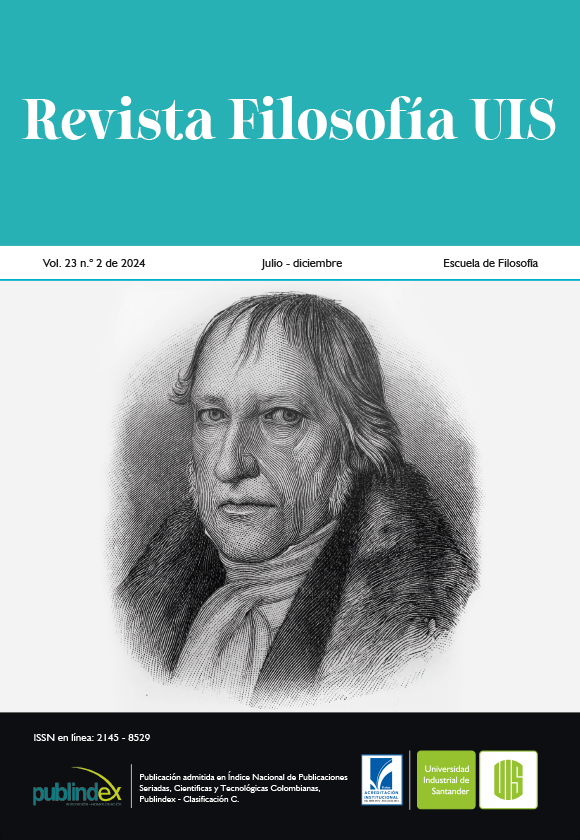Published 2024-07-23
Keywords
- Taxonomy,
- kind of reasons,
- theorical reasoning,
- practical reasoning,
- legal normativity
How to Cite
Copyright (c) 2024 Revista Filosofía UIS

This work is licensed under a Creative Commons Attribution 4.0 International License.
Abstract
This essay attempts to provide a comprehensive account of the various kinds of reasons regarding theoretical and practical reasoning. It distinguishes the following kinds of reason: (1) epistemic and practical reasons; (2) source-based and content-based reasons; (3) defeasible and conclusive reasons; (4) motivating, explanatory, and justifying reasons; (5) objective and subjective reasons; (6) first-order and second-order reasons; (7) inclusionary and exclusionary reasons; and (8) intrinsic and instrumental reasons. These distinctions are then applied to the problem of explaining legal normativity.
Downloads
References
- Adams, R. (1987). The Virtue of Faith and others Essays in Philosophical Theology. Oxford University Press.
- Alvarez, M. (2017). Reasons for Action: Justification, Motivation and Explanation. En E. Zalta (ed.). Stanford Encyclopedia of Philosophy. https://plato.stanford.edu/cgi-bin/encyclopedia/archinfo.cgi?entry=reasons-just-vs-expl
- Bratman, M. (1987). Intention, Plans and Practical Reason. Harvard University Press.
- Brunero, J. (2022). Practical Reasonns, Theoretical Reasons, and Permissive and Prohibitive Balancing. Synthese, 200(22), 1-23. https://doi.org/10.1007/s11229-022-03628-8
- Bonjour, L. y Sosa, E. (2003). Epistemic Justification: Internalism vs. Externalism, Foundations vs. Virtues. Wiley-Blackwell.
- Cambridge English Dictionary (2024). Dictionary. Cambridge University Press & Assessment. https://dictionary.cambridge.org/us/dictionary/english/guide
- Campbell, R. (2019). Moral Epistemology. En E. Zalta (ed.). Stanford Encyclopedia of Philosophy. Stanford University. https://plato.stanford.edu/cgi-bin/encyclopedia/archinfo.cgi?entry=moral-epistemology
- Comesaña, M. (1992). Putnam: los cerebros en la cubeta y el realismo interno. Páginas de Filosofía, 2(1), 18-23. https://revele.uncoma.edu.ar/index.php/filosofia/article/view/571
- Copi, I., Cohen, C., y Rodych, V. (2019). Introduction to logic. Taylor & Francis.
- Copp, D. y Morton, J. (2022). Normativity in Metaethics. En E. Zalta (ed.). Standford Encyclopedia of Philosophy. https://plato.stanford.edu/cgi-bin/encyclopedia/archinfo.cgi?entry=normativity-metaethics
- Crisp, R. (2018). Prudential and Moral Reasons. En D. Star (ed.). The Oxford Handbook Of Reasons And Normativity. Oxford University Press.
- Dancy, J. (2000). Practical Reality. Clarendon Press.
- Dworkin, R. (1986). Law’s Empire. Harvard University Press.
- Edmundson, W. (1998). Legitimate Authority without Political Obligation, Law and Philosophy, 17(1), 43-60.
- Finnis, J. (1996). The Truth in legal Positivism. En P. George (ed.). The Autonomy of Law. Clarendon Press.
- Finnis, J. (2020). Natural Law Theories. En E. Zalta (ed.). Stanford Encyclopedia of Law. https://plato.stanford.edu/entries/natural-law-theories/#LexIniNonEstLexDoSerUnjLawBinLeg
- Frankena, W. (1966). The concept of Morality, Journal of philosophy, 63(21). 688-696.
- Harman, G. (2004). Practical Aspects of Theoretical Reasoning. En A. Mele y P. Rawling (eds.). The Oxford Handbook of Rationality. University Press.
- Harman, R. (1986). Change in View. MIT Press.
- Hart, H.L.A. (1958). Legal and Moral Obligations. En A.I. Melden (ed.). Essays on Moral Philosophy. University of Washington Press.
- Hart, H.L.A. (1982). Commands and Autoritative Legal Reasons. En H.L.A Hart. Essays in Bentham. Clarendon Press.
- Hart, H.L.A. (1998). El concepto de derecho (G. Carrió, trad.). Abeledo Perrot.
- Hume, D. (1984). Tratado de la Naturaleza Humana III (F. Duque, trad.). Ediciones Orbis.
- Kaplan, D. (1989). Demonstratives. En J. Almog, J. Perry, y H. Wettstein (eds.). Themes From Kaplan. Oxford University Press, pp. 481-563.
- McNaughton, D. y Rawling, P. (2018). Motivating Reasons and Normative Reasons. En D. Star (ed.). The Oxford Handbook Of Reasons And Normativity. Oxford University Press.
- Merriam-Webster (2024). Dictionary. Merriam-Webster Inc. https://www.merriam webster.com/
- Oxford English Dictionary (2024). Dictionary. Oxford University Press. https://www.oed.com/dictionary/guide_n?tab=factsheet#2304997
- Raz, J. (1986). The Morality of Freedom. Clarendon Press.
- Raz, J. (2009). Can There Be a Theory of Law? En J. Raz. Between Authority and Interpretation. Oxford University Press.
- Ryan, R., y Deci, E. (2000). Intrinsic and Extrinsic Motivations: Classic Definitions and New Directions, Contemporary Educational Psychology, 25(1) 55-67.
- Shapiro, S. (2014). Legalidad (D. Papayannis y L. Lorena, trads.). Marcial Pons.
- Swinburne, R. (2001). Epistemic Justification. Clarendon Press.
- Trigos, L. (2009). Revisión de los conceptos contexto y circunstancia en la teoría de referencia directa para indexicales de D. Kaplan, Discusiones filosóficas, 10(15), 13-22. https://revistasojs.ucaldas.edu.co/index.php/discusionesfilosoficas/article/view/659
- Wodak, D. (2017). Can Objectivists Account for Subjective Reasons?, Journal of Ethics and Social Philosophy, 12(3), 259-279.

